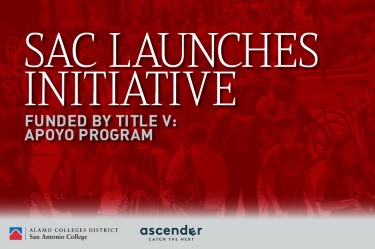SAC receives $2.5 million to grow enrollment, retention of underserved students
June 1, 2023
A $2.5 million, five-year grant will help San Antonio College provide a broader range of support to underserved students.
The Title V Grant: Apoyo Program aims to increase overall student enrollment and retention through the Ascender program, which supports underserved first-time college students, including Hispanic and low-income students.
“SAC already does an awesome job for all of our students. This is going to be extra support for those first-time-in-college students and first-generation college students,” said Dr. Joan Jaimes, director of Teaching and Learning and director of the Ascender program.
 Ascender provides extra academic and social support to students who qualify. Resources include one-on-one advising, courses taught by specially trained instructors and an academic cohort that keeps students in the program grouped together across multiple classes to create a network of peers.
Ascender provides extra academic and social support to students who qualify. Resources include one-on-one advising, courses taught by specially trained instructors and an academic cohort that keeps students in the program grouped together across multiple classes to create a network of peers.
The goal is for Ascender to increase enrollment in Ascender to 2,000 students. In the first semester of 2023, approximately 480 students were enrolled in Ascender.
The grant will not only recruit more students into Ascender but will expand the program’s services with the addition of peer coaches and mentors. The grant will fund at least 100 work-study students to serve as peer coaches and peer advisors.
Peer coaches will serve as tutors, helping students in their coursework, and as coaches and mentors, supporting students socially, making sure they feel like they belong, and helping them navigate the college experience.
Peer advisors help ensure Ascender students progress in their coursework and degree programs, answering questions and connecting them to the resources they need.
Peer advisors are a way for Ascender students to get guidance and simple questions answered without waiting for an advisor appointment.
“They have these questions and wonder who to ask. A lot of times they feel intimidated to ask those questions,” said Apoyo Grant Project Director Patricia Medina. “A peer advisor is less intimidating. They’ve already been through this, so they know what the student is going through.”
“It takes pressure off advisors and gives one-on-one support to students who need it,” said Mona Aldana-Ramírez, director of Diversity, Equity and Inclusive Excellence at SAC. “It really is an opportunity to restructure and revamp how we do advising.
”The grant will also fund more staff and professional development to recruit more staff into the Ascender model. Faculty who complete Ascender training learn culturally relevant, evidence-based teaching practices.
“It provides money for faculty development training on culturally relevant and inclusive pedagogies, which is something happening right now in higher ed,” said Aldana-Ramírez. “It’s crucial to retention and completion.”
Research shows that first-generation college students often leave because of small and large financial stresses, such as car repairs, doctor bills or supporting their families, said Aldana-Ramírez. While SAC offers many resources to help, including a campus food bank, clothes closet and healthcare clinic, connecting students to resources can be challenging.
“The resources and support are here at SAC,” said Aldana-Ramírez. “It’s a matter of hiring people to help, to be that safety net, to connect students to all the resources we have.”
SAC won the Title V Department of Education grant, which is designated for developing Hispanic-serving institutions, in October 2022. Medina started as program director in May and plans to hire at least five staff members.
Apoyo, which means support in Spanish, refers to the program’s focus on building relationships and connection with students to help them complete their education goals and stay in school.
“We are in the people business and we need more people to help and to just sometimes come face-to-face with someone and say ‘Hey, I know what you’re going through, I was there last semester,’” said Aldana-Ramírez. “This is a huge way to fulfill our equity promise to our community.”
-SAC-
